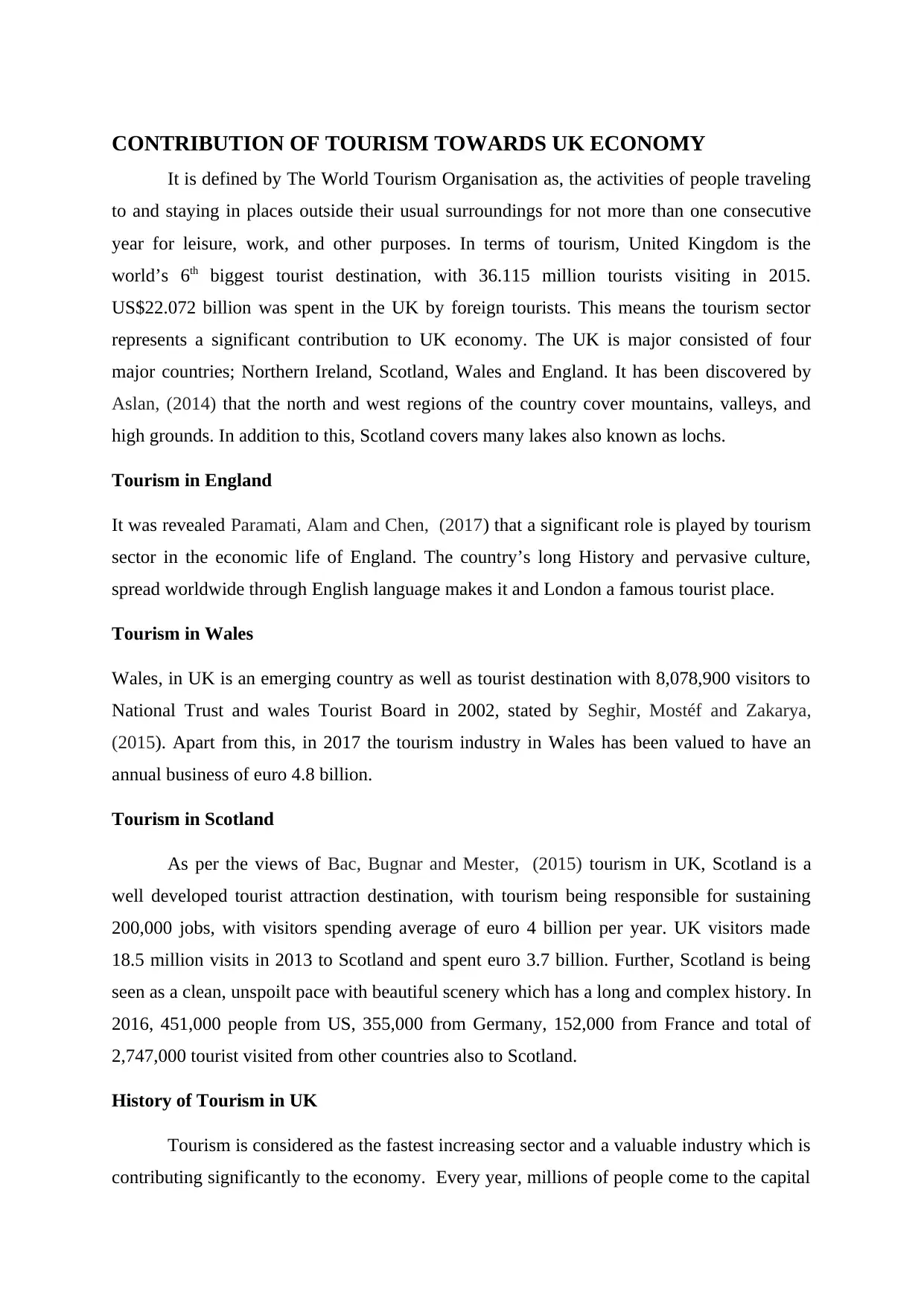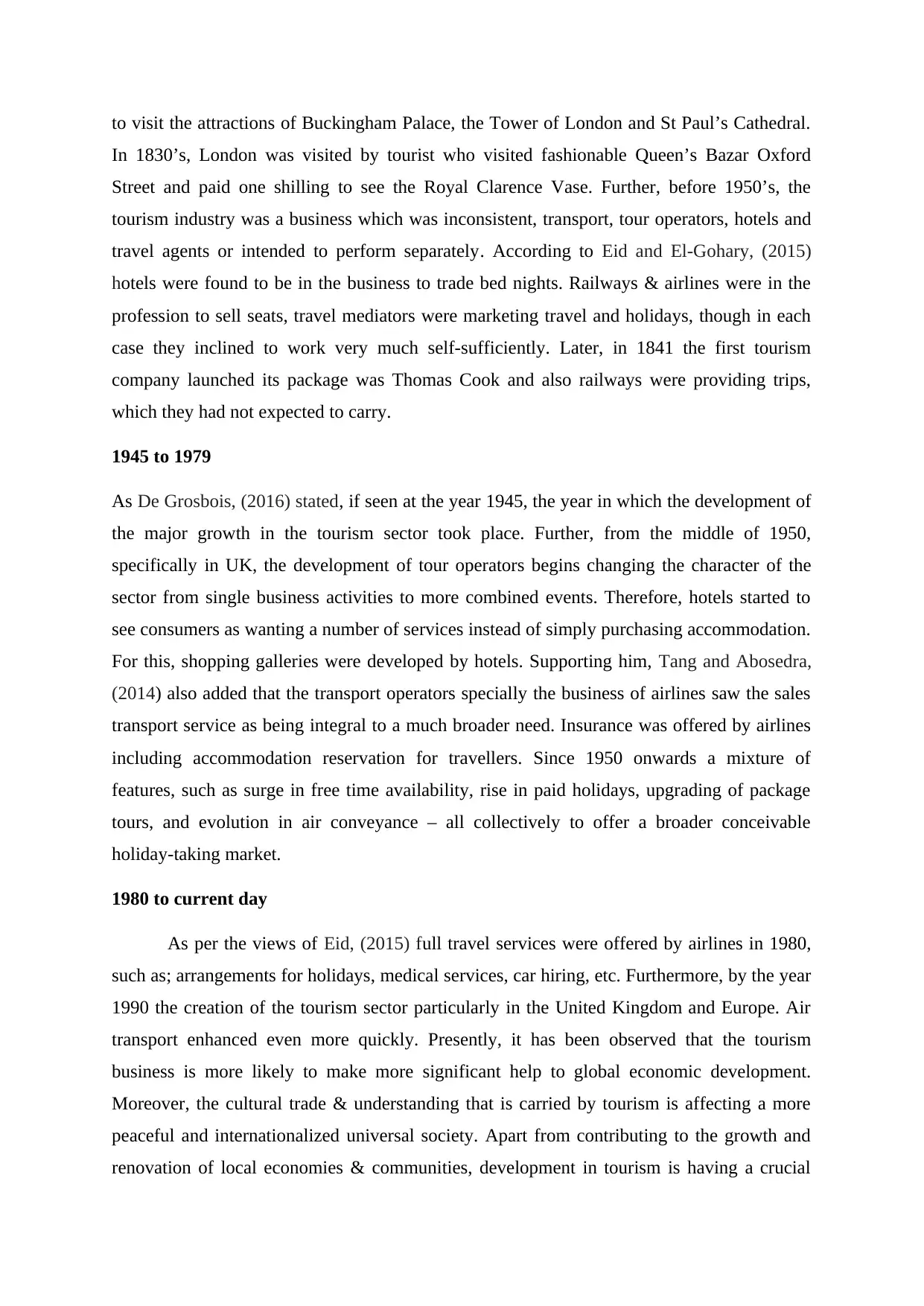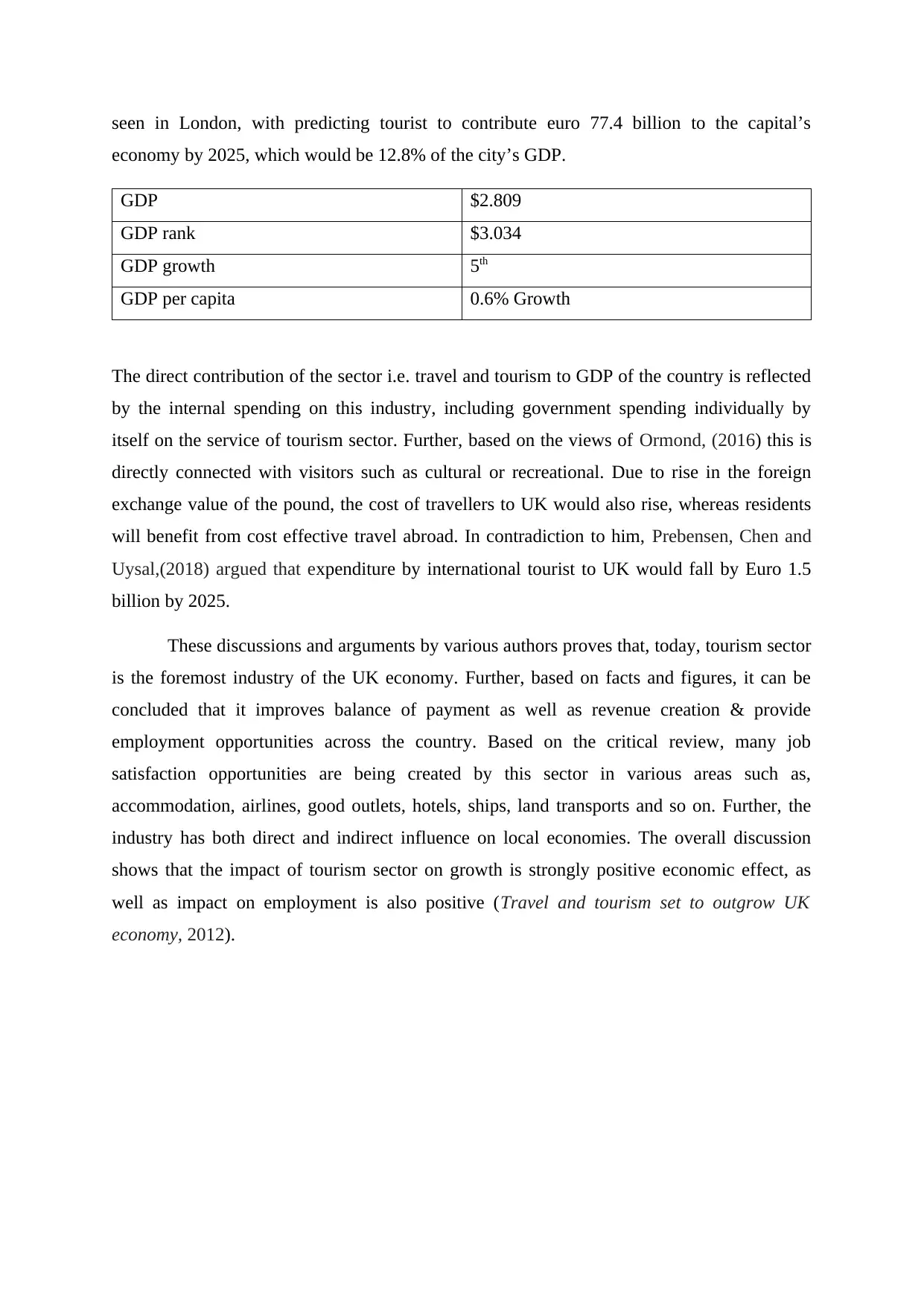Comprehensive Report: UK Tourism's Economic Contribution Analysis
VerifiedAdded on 2023/02/02
|9
|2108
|97
Report
AI Summary
This report provides a comprehensive analysis of the tourism sector's contribution to the UK economy. It defines tourism, highlighting the UK's position as a major tourist destination and its economic impact, referencing statistics on visitor numbers and spending. The report explores tourism in England, Wales, and Scotland, detailing their unique attractions and contributions. It traces the history of UK tourism, from its early days to the present, discussing key developments like the rise of package tours and airlines. The report examines the industry's growth, including visitor numbers, spending, and its impact on GDP and employment. The report also discusses the sector's future, citing forecasts for continued growth and its role in supporting jobs, local economies, and cultural exchange. The report concludes that tourism is a crucial sector for the UK economy, improving balance of payment and revenue creation.

Tourism
Paraphrase This Document
Need a fresh take? Get an instant paraphrase of this document with our AI Paraphraser

Table of Contents
CONTRIBUTION OF TOURISM TOWARDS UK ECONOMY......................................2
REFERENCES.........................................................................................................................7
CONTRIBUTION OF TOURISM TOWARDS UK ECONOMY......................................2
REFERENCES.........................................................................................................................7

CONTRIBUTION OF TOURISM TOWARDS UK ECONOMY
It is defined by The World Tourism Organisation as, the activities of people traveling
to and staying in places outside their usual surroundings for not more than one consecutive
year for leisure, work, and other purposes. In terms of tourism, United Kingdom is the
world’s 6th biggest tourist destination, with 36.115 million tourists visiting in 2015.
US$22.072 billion was spent in the UK by foreign tourists. This means the tourism sector
represents a significant contribution to UK economy. The UK is major consisted of four
major countries; Northern Ireland, Scotland, Wales and England. It has been discovered by
Aslan, (2014) that the north and west regions of the country cover mountains, valleys, and
high grounds. In addition to this, Scotland covers many lakes also known as lochs.
Tourism in England
It was revealed Paramati, Alam and Chen, (2017) that a significant role is played by tourism
sector in the economic life of England. The country’s long History and pervasive culture,
spread worldwide through English language makes it and London a famous tourist place.
Tourism in Wales
Wales, in UK is an emerging country as well as tourist destination with 8,078,900 visitors to
National Trust and wales Tourist Board in 2002, stated by Seghir, Mostéf and Zakarya,
(2015). Apart from this, in 2017 the tourism industry in Wales has been valued to have an
annual business of euro 4.8 billion.
Tourism in Scotland
As per the views of Bac, Bugnar and Mester, (2015) tourism in UK, Scotland is a
well developed tourist attraction destination, with tourism being responsible for sustaining
200,000 jobs, with visitors spending average of euro 4 billion per year. UK visitors made
18.5 million visits in 2013 to Scotland and spent euro 3.7 billion. Further, Scotland is being
seen as a clean, unspoilt pace with beautiful scenery which has a long and complex history. In
2016, 451,000 people from US, 355,000 from Germany, 152,000 from France and total of
2,747,000 tourist visited from other countries also to Scotland.
History of Tourism in UK
Tourism is considered as the fastest increasing sector and a valuable industry which is
contributing significantly to the economy. Every year, millions of people come to the capital
It is defined by The World Tourism Organisation as, the activities of people traveling
to and staying in places outside their usual surroundings for not more than one consecutive
year for leisure, work, and other purposes. In terms of tourism, United Kingdom is the
world’s 6th biggest tourist destination, with 36.115 million tourists visiting in 2015.
US$22.072 billion was spent in the UK by foreign tourists. This means the tourism sector
represents a significant contribution to UK economy. The UK is major consisted of four
major countries; Northern Ireland, Scotland, Wales and England. It has been discovered by
Aslan, (2014) that the north and west regions of the country cover mountains, valleys, and
high grounds. In addition to this, Scotland covers many lakes also known as lochs.
Tourism in England
It was revealed Paramati, Alam and Chen, (2017) that a significant role is played by tourism
sector in the economic life of England. The country’s long History and pervasive culture,
spread worldwide through English language makes it and London a famous tourist place.
Tourism in Wales
Wales, in UK is an emerging country as well as tourist destination with 8,078,900 visitors to
National Trust and wales Tourist Board in 2002, stated by Seghir, Mostéf and Zakarya,
(2015). Apart from this, in 2017 the tourism industry in Wales has been valued to have an
annual business of euro 4.8 billion.
Tourism in Scotland
As per the views of Bac, Bugnar and Mester, (2015) tourism in UK, Scotland is a
well developed tourist attraction destination, with tourism being responsible for sustaining
200,000 jobs, with visitors spending average of euro 4 billion per year. UK visitors made
18.5 million visits in 2013 to Scotland and spent euro 3.7 billion. Further, Scotland is being
seen as a clean, unspoilt pace with beautiful scenery which has a long and complex history. In
2016, 451,000 people from US, 355,000 from Germany, 152,000 from France and total of
2,747,000 tourist visited from other countries also to Scotland.
History of Tourism in UK
Tourism is considered as the fastest increasing sector and a valuable industry which is
contributing significantly to the economy. Every year, millions of people come to the capital
⊘ This is a preview!⊘
Do you want full access?
Subscribe today to unlock all pages.

Trusted by 1+ million students worldwide

to visit the attractions of Buckingham Palace, the Tower of London and St Paul’s Cathedral.
In 1830’s, London was visited by tourist who visited fashionable Queen’s Bazar Oxford
Street and paid one shilling to see the Royal Clarence Vase. Further, before 1950’s, the
tourism industry was a business which was inconsistent, transport, tour operators, hotels and
travel agents or intended to perform separately. According to Eid and El-Gohary, (2015)
hotels were found to be in the business to trade bed nights. Railways & airlines were in the
profession to sell seats, travel mediators were marketing travel and holidays, though in each
case they inclined to work very much self-sufficiently. Later, in 1841 the first tourism
company launched its package was Thomas Cook and also railways were providing trips,
which they had not expected to carry.
1945 to 1979
As De Grosbois, (2016) stated, if seen at the year 1945, the year in which the development of
the major growth in the tourism sector took place. Further, from the middle of 1950,
specifically in UK, the development of tour operators begins changing the character of the
sector from single business activities to more combined events. Therefore, hotels started to
see consumers as wanting a number of services instead of simply purchasing accommodation.
For this, shopping galleries were developed by hotels. Supporting him, Tang and Abosedra,
(2014) also added that the transport operators specially the business of airlines saw the sales
transport service as being integral to a much broader need. Insurance was offered by airlines
including accommodation reservation for travellers. Since 1950 onwards a mixture of
features, such as surge in free time availability, rise in paid holidays, upgrading of package
tours, and evolution in air conveyance – all collectively to offer a broader conceivable
holiday-taking market.
1980 to current day
As per the views of Eid, (2015) full travel services were offered by airlines in 1980,
such as; arrangements for holidays, medical services, car hiring, etc. Furthermore, by the year
1990 the creation of the tourism sector particularly in the United Kingdom and Europe. Air
transport enhanced even more quickly. Presently, it has been observed that the tourism
business is more likely to make more significant help to global economic development.
Moreover, the cultural trade & understanding that is carried by tourism is affecting a more
peaceful and internationalized universal society. Apart from contributing to the growth and
renovation of local economies & communities, development in tourism is having a crucial
In 1830’s, London was visited by tourist who visited fashionable Queen’s Bazar Oxford
Street and paid one shilling to see the Royal Clarence Vase. Further, before 1950’s, the
tourism industry was a business which was inconsistent, transport, tour operators, hotels and
travel agents or intended to perform separately. According to Eid and El-Gohary, (2015)
hotels were found to be in the business to trade bed nights. Railways & airlines were in the
profession to sell seats, travel mediators were marketing travel and holidays, though in each
case they inclined to work very much self-sufficiently. Later, in 1841 the first tourism
company launched its package was Thomas Cook and also railways were providing trips,
which they had not expected to carry.
1945 to 1979
As De Grosbois, (2016) stated, if seen at the year 1945, the year in which the development of
the major growth in the tourism sector took place. Further, from the middle of 1950,
specifically in UK, the development of tour operators begins changing the character of the
sector from single business activities to more combined events. Therefore, hotels started to
see consumers as wanting a number of services instead of simply purchasing accommodation.
For this, shopping galleries were developed by hotels. Supporting him, Tang and Abosedra,
(2014) also added that the transport operators specially the business of airlines saw the sales
transport service as being integral to a much broader need. Insurance was offered by airlines
including accommodation reservation for travellers. Since 1950 onwards a mixture of
features, such as surge in free time availability, rise in paid holidays, upgrading of package
tours, and evolution in air conveyance – all collectively to offer a broader conceivable
holiday-taking market.
1980 to current day
As per the views of Eid, (2015) full travel services were offered by airlines in 1980,
such as; arrangements for holidays, medical services, car hiring, etc. Furthermore, by the year
1990 the creation of the tourism sector particularly in the United Kingdom and Europe. Air
transport enhanced even more quickly. Presently, it has been observed that the tourism
business is more likely to make more significant help to global economic development.
Moreover, the cultural trade & understanding that is carried by tourism is affecting a more
peaceful and internationalized universal society. Apart from contributing to the growth and
renovation of local economies & communities, development in tourism is having a crucial
Paraphrase This Document
Need a fresh take? Get an instant paraphrase of this document with our AI Paraphraser

role in both promoting education and making better position of this business. Therefore, this
states that tourism has the power to influence cultural change. However, from the
environmental point of view tourism is frequently more satisfactory and desirable than any
other industrial production, as it is environmentally friendly.
Tourism in UK, currently
Visit to UK, overseas are prepared to pass 40 million for the first time in 2018, also,
according to visit Britain, which is forecasting that tourist will spend a record of euro 27
billion over the coming 12 months, said Mason, (2015). A decline in double-digit in the
pounds in contradiction of the euro and dollar is assisting to drive more travellers and
enabling tourism to lowest prediction of a post-referendum strike in the British economy.
Recently, it was stated by the National tourism agency that 2017 was a record making year
for inbound tourism to the United Kingdom, with 39.9 million visitors. Further, a forecast is
being made which shows that the upcoming year it will reach 41.7 million as 4.4% increase
on this year. Moreover, this will result in record year by hotels, restaurants in London, bath,
Edinburgh and Cambridge.
Illustration 1 Number of visitors
states that tourism has the power to influence cultural change. However, from the
environmental point of view tourism is frequently more satisfactory and desirable than any
other industrial production, as it is environmentally friendly.
Tourism in UK, currently
Visit to UK, overseas are prepared to pass 40 million for the first time in 2018, also,
according to visit Britain, which is forecasting that tourist will spend a record of euro 27
billion over the coming 12 months, said Mason, (2015). A decline in double-digit in the
pounds in contradiction of the euro and dollar is assisting to drive more travellers and
enabling tourism to lowest prediction of a post-referendum strike in the British economy.
Recently, it was stated by the National tourism agency that 2017 was a record making year
for inbound tourism to the United Kingdom, with 39.9 million visitors. Further, a forecast is
being made which shows that the upcoming year it will reach 41.7 million as 4.4% increase
on this year. Moreover, this will result in record year by hotels, restaurants in London, bath,
Edinburgh and Cambridge.
Illustration 1 Number of visitors

(Source: UK braced for record numbers of tourist in 2018. 2018)
Illustration 2 Spending by visitors
(Source: UK braced for record numbers of tourist in 2018. 2018)
Mowforth and Munt, (2015) argued that, it has been discovered that in 2017 there
were 5million travellers visited UK including markets such as; Australia, China, India and the
Gulf. In addition, the Country was ranked at third number for tourism globally in the 2017
Anholt-GfK National Brand Index published last month, equally it is the highest rank ever. A
new report into tourism sector demonstrates that Britain will have the industry worth more
than euro 257 billion by 2025, which will further support over 3.7 million jobs and equal
almost 10% of the UK GDP. Deloitte conducted a study for VistBritain, displays the value of
the tourism sector to the UK. The present worth of it is euro 127 billion and is set to expand
quicker than the manufacturing, construction and retail businesses. A boom in visitors will be
Illustration 2 Spending by visitors
(Source: UK braced for record numbers of tourist in 2018. 2018)
Mowforth and Munt, (2015) argued that, it has been discovered that in 2017 there
were 5million travellers visited UK including markets such as; Australia, China, India and the
Gulf. In addition, the Country was ranked at third number for tourism globally in the 2017
Anholt-GfK National Brand Index published last month, equally it is the highest rank ever. A
new report into tourism sector demonstrates that Britain will have the industry worth more
than euro 257 billion by 2025, which will further support over 3.7 million jobs and equal
almost 10% of the UK GDP. Deloitte conducted a study for VistBritain, displays the value of
the tourism sector to the UK. The present worth of it is euro 127 billion and is set to expand
quicker than the manufacturing, construction and retail businesses. A boom in visitors will be
⊘ This is a preview!⊘
Do you want full access?
Subscribe today to unlock all pages.

Trusted by 1+ million students worldwide

seen in London, with predicting tourist to contribute euro 77.4 billion to the capital’s
economy by 2025, which would be 12.8% of the city’s GDP.
GDP $2.809
GDP rank $3.034
GDP growth 5th
GDP per capita 0.6% Growth
The direct contribution of the sector i.e. travel and tourism to GDP of the country is reflected
by the internal spending on this industry, including government spending individually by
itself on the service of tourism sector. Further, based on the views of Ormond, (2016) this is
directly connected with visitors such as cultural or recreational. Due to rise in the foreign
exchange value of the pound, the cost of travellers to UK would also rise, whereas residents
will benefit from cost effective travel abroad. In contradiction to him, Prebensen, Chen and
Uysal,(2018) argued that expenditure by international tourist to UK would fall by Euro 1.5
billion by 2025.
These discussions and arguments by various authors proves that, today, tourism sector
is the foremost industry of the UK economy. Further, based on facts and figures, it can be
concluded that it improves balance of payment as well as revenue creation & provide
employment opportunities across the country. Based on the critical review, many job
satisfaction opportunities are being created by this sector in various areas such as,
accommodation, airlines, good outlets, hotels, ships, land transports and so on. Further, the
industry has both direct and indirect influence on local economies. The overall discussion
shows that the impact of tourism sector on growth is strongly positive economic effect, as
well as impact on employment is also positive (Travel and tourism set to outgrow UK
economy, 2012).
economy by 2025, which would be 12.8% of the city’s GDP.
GDP $2.809
GDP rank $3.034
GDP growth 5th
GDP per capita 0.6% Growth
The direct contribution of the sector i.e. travel and tourism to GDP of the country is reflected
by the internal spending on this industry, including government spending individually by
itself on the service of tourism sector. Further, based on the views of Ormond, (2016) this is
directly connected with visitors such as cultural or recreational. Due to rise in the foreign
exchange value of the pound, the cost of travellers to UK would also rise, whereas residents
will benefit from cost effective travel abroad. In contradiction to him, Prebensen, Chen and
Uysal,(2018) argued that expenditure by international tourist to UK would fall by Euro 1.5
billion by 2025.
These discussions and arguments by various authors proves that, today, tourism sector
is the foremost industry of the UK economy. Further, based on facts and figures, it can be
concluded that it improves balance of payment as well as revenue creation & provide
employment opportunities across the country. Based on the critical review, many job
satisfaction opportunities are being created by this sector in various areas such as,
accommodation, airlines, good outlets, hotels, ships, land transports and so on. Further, the
industry has both direct and indirect influence on local economies. The overall discussion
shows that the impact of tourism sector on growth is strongly positive economic effect, as
well as impact on employment is also positive (Travel and tourism set to outgrow UK
economy, 2012).
Paraphrase This Document
Need a fresh take? Get an instant paraphrase of this document with our AI Paraphraser

REFERENCES
Aslan, A., 2014. Tourism development and economic growth in the Mediterranean countries:
Evidence from panel Granger causality tests. Current issues in Tourism, 17(4), pp.363-
372.
Bac, D. P., Bugnar, N. G. and Mester, L. E., 2015. Terrorism and its impacts on the tourism
industry. Revista Română de Geografie Politică. 17(1). pp.5-11.
De Grosbois, D., 2016. Corporate social responsibility reporting in the cruise tourism
industry: a performance evaluation using a new institutional theory based
model. Journal of Sustainable Tourism. 24(2). pp.245-269.
Eid, R. and El-Gohary, H., 2015. Muslim tourist perceived value in the hospitality and
tourism industry. Journal of Travel Research. 54(6). pp.774-787.
Eid, R., 2015. Integrating Muslim customer perceived value, satisfaction, loyalty and
retention in the tourism industry: An empirical study. International Journal of Tourism
Research. 17(3). pp.249-260.
Mason, P., 2015. Tourism impacts, planning and management. Routledge.
Mowforth, M. and Munt, I., 2015. Tourism and sustainability: Development, globalisation
and new tourism in the third world. Routledge.
Ormond, M., 2016. Knowledge transfer in the ‘medical tourism’industry: The role of
transnational migrant patients and health workers. Handbook of migration and health.
pp. London: Edward Elgar.
Paramati, S. R., Alam, M. S. and Chen, C. F., 2017. The effects of tourism on economic
growth and CO2 emissions: a comparison between developed and developing
economies. Journal of Travel Research. 56(6). pp.712-724.
Prebensen, N. K., Chen, J. S. and Uysal, M. eds., 2018. Creating experience value in tourism.
Cabi.
Seghir, G. M., Mostéfa, B. and Zakarya, G.Y., 2015. Tourism spending-economic growth
causality in 49 countries: A dynamic panel data approach. Procedia Economics and
Finance. 23(1613-1623).
Aslan, A., 2014. Tourism development and economic growth in the Mediterranean countries:
Evidence from panel Granger causality tests. Current issues in Tourism, 17(4), pp.363-
372.
Bac, D. P., Bugnar, N. G. and Mester, L. E., 2015. Terrorism and its impacts on the tourism
industry. Revista Română de Geografie Politică. 17(1). pp.5-11.
De Grosbois, D., 2016. Corporate social responsibility reporting in the cruise tourism
industry: a performance evaluation using a new institutional theory based
model. Journal of Sustainable Tourism. 24(2). pp.245-269.
Eid, R. and El-Gohary, H., 2015. Muslim tourist perceived value in the hospitality and
tourism industry. Journal of Travel Research. 54(6). pp.774-787.
Eid, R., 2015. Integrating Muslim customer perceived value, satisfaction, loyalty and
retention in the tourism industry: An empirical study. International Journal of Tourism
Research. 17(3). pp.249-260.
Mason, P., 2015. Tourism impacts, planning and management. Routledge.
Mowforth, M. and Munt, I., 2015. Tourism and sustainability: Development, globalisation
and new tourism in the third world. Routledge.
Ormond, M., 2016. Knowledge transfer in the ‘medical tourism’industry: The role of
transnational migrant patients and health workers. Handbook of migration and health.
pp. London: Edward Elgar.
Paramati, S. R., Alam, M. S. and Chen, C. F., 2017. The effects of tourism on economic
growth and CO2 emissions: a comparison between developed and developing
economies. Journal of Travel Research. 56(6). pp.712-724.
Prebensen, N. K., Chen, J. S. and Uysal, M. eds., 2018. Creating experience value in tourism.
Cabi.
Seghir, G. M., Mostéfa, B. and Zakarya, G.Y., 2015. Tourism spending-economic growth
causality in 49 countries: A dynamic panel data approach. Procedia Economics and
Finance. 23(1613-1623).

Tang, C. F. and Abosedra, S., 2014. The impacts of tourism, energy consumption and
political instability on economic growth in the MENA countries. Energy Policy, 68,
pp.458-464.
Online
Travel and tourism set to outgrow UK economy. 2012. [Online]. Available on:
<http://www.travelweekly.co.uk/articles/39771/travel-and-tourism-set-to-outgrow-uk-
economy>
political instability on economic growth in the MENA countries. Energy Policy, 68,
pp.458-464.
Online
Travel and tourism set to outgrow UK economy. 2012. [Online]. Available on:
<http://www.travelweekly.co.uk/articles/39771/travel-and-tourism-set-to-outgrow-uk-
economy>
⊘ This is a preview!⊘
Do you want full access?
Subscribe today to unlock all pages.

Trusted by 1+ million students worldwide
1 out of 9
Related Documents
Your All-in-One AI-Powered Toolkit for Academic Success.
+13062052269
info@desklib.com
Available 24*7 on WhatsApp / Email
![[object Object]](/_next/static/media/star-bottom.7253800d.svg)
Unlock your academic potential
Copyright © 2020–2026 A2Z Services. All Rights Reserved. Developed and managed by ZUCOL.




